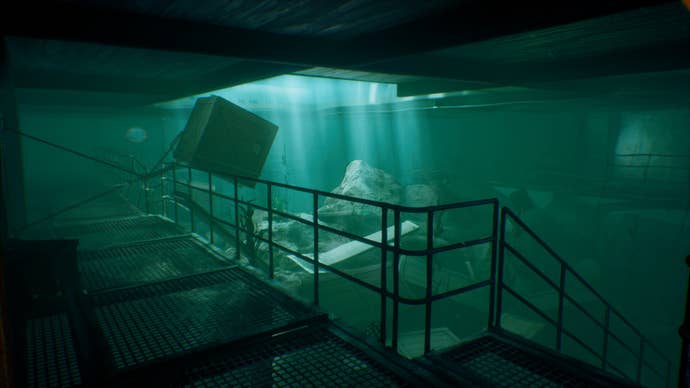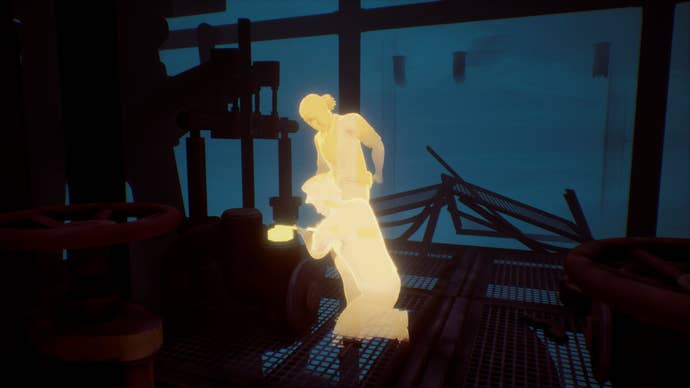I’m looking for something. I don’t know what it is, but I need to find it, and my map swears blind it’s here. I’ve done more laps of a purposefully bare room than I can count, desperately scouring every nook and cranny, just in case it’s hidden down the side of the fireplace, or inside an antique globe. It’s not. Suddenly, I become acutely aware of just how long I’ve spent not watching my back, and snap my eyes back towards the door I came in through.
It sits wide open, and beyond it lies the ocean that’s filled up the submerged rooms of the sunken craft I’ve been prowling the bowels of. There was never going to anyone watching me, but for a moment, I felt totally sure there was. The thing I’m looking for is on the balcony above me. I won’t find it for a little while yet.
It took me a little bit of time to get to the point where I felt like I was clicking with Thalassa: Edge of the Abyss, the latest game from Norwegian indie studio Sarepta Studio. But once I did, the game really dug its hooks in. Encased in the kind of early-20th century diving suit nightmares are made of, the game sends you to explore the wrecked remains of the S.S. Thalassa, which sank to the depths under mysterious circumstances not long after the protagonist and the person overseeing this latest dive took shore leave to following a fatal accident that claimed the life of one of their crewmates.
The mission that awaits you in the final resting place of the vessel is simple. Just figure out what on Earth happened, so that their families – and you – can secure some closure. You do this by taking on the role of lone underwater detective, searching the flooded and damaged rooms and sections of an early 1900s private liner designed to allow its wealthy owner, Isabel Greenwood, to fulfil her archeological dream of raising a Spanish galleon from the depths, for notes, items, and wax roll audio recordings that’ll help you piece things together. The immediate comparison you might make (and I certainly did when I initially tried the game’s Steam next fest demo) is to Lucas Pope’s Return of the Obra Dinn.

While I’d be surprised to learn that the two don’t at the very least share some inspirations, I think Thalassa sets itself apart enough from that other very good game by being less heavily stylised, and by playing much more heavily into the deep personal connections its protagonist has to those lost souls whose lives they’re dredging up and sifting through. Your biggest focus isn’t trying to pin down simple details, like putting names to faces, before you dig into the how of it all – the how of it all is the thing from the get go. How did this happen to people I knew and cared about?
It’s a lot more in your face with its questioning of you than the generally quite subtle Obra Dinn, and that isn’t a bad thing. In truth, the only area I think Thalassa might lag behind its spiritual sibling is not making more use of its historical setting as an unshakeable and defining element of its character.
As you might expect, given that theming, it’s the emotion that really puts meat on the bones of Thalassa’s gameplay, which is comprised of equal parts exploratory or crime scene walking sim and mystery solving via a menu that sees you slot all the evidence you’ve collected into the gaps connecting together different scenarios. You might find both to be a bit slow and laborious if you’re a particularly rapid Inspector Clouseau, but that plays pretty well into the tale Thalassa’s telling.

You’re supposed to take time to absorb the unnatural beauty of lodgings people recently called home, gradually rusting and crumbling away, as fish gently glide in and out of their smashed windows and pinned-open doors. You’re not supposed to rest until you’ve compiled every detail of events that have already had their basic gist leap off the page at you. You’re supposed to take time to think, as the voices of a couple of your crewmates echo through your skull, reacting to your discoveries and offering their thoughts on them.
While I can’t get too far into just what makes certain characters and performances really make the exploration of complex themes that Thalassa engages in hit home as hard as it should without wandering into spoiler territory, I will say the following: survivor’s guilt is the big one, and the game treats it very deftly for the most part, really putting you into the shoes of someone stuck in a helpless cycle of regret and grief that sees them constantly forced to dwell on what they’ve lost.
Baldur’s Gate 3 alumni Amelia Tyler and Peter Hannah – as Alex and Bailey, respectively – are tasked with delivering the most important performances when it comes to this, and they both do an outstanding job with dialogue that, while it can be a little wooden in other areas of the game, really steps up and delivers memorably in the places that matter most. There are dream-like sequences the protagonist slips into at certain key points in the plot, and without great voice acting, they’d have been difficult to pull off while maintaining the serious tone the game’s generally going for.
Beyond those two, I wouldn’t say there are any weak links in the rest of the cast of characters, with each being given enough screen time and depth to play their role in proceedings and enough interesting connections to the rest of the crew that they feel like a realistic, well-developed group. No one feels left on an island, superfluous, or without at least one flaw or trait to make them interesting, which can be tough to pull off in a game with a relatively concise runtime.
Similar line-treading has been done when it comes to the tone, and I think Sarepta’s done well to build on the work it did with My Child Lebensborn in terms of digging into complex and uncomfortable themes, while this time making sure it’s still delivering an experience that’s fun enough. That said, you’re obviously not going to be heading down the road of laugh-a-minute hijinks and energetic action if you’re making a game like this, so I’d maybe skip out on this if by some work of bizarre and hilarious dark magic it pops up in the ‘games like Fortnite’ section of your storefront of choice.
I can’t really talk about the climax of the game’s narrative without wandering into spoiler territory as before, but it’ll sum it up thusly – Thalassa’s story is something that only gets better as it goes.
There are a few moments early on and just before you really plunge off the deep end into the final sequence when the flow stumbles a bit – or, in the latter case, can grind to a halt without expressly telling you why if you’ve not solved nearly all of the mysteries – but for the most part, she’s sailing right and true enough to sweep you up on her wave. And once you get to the conclusion, you’re in for an ending that feels just right for the tale being told, no matter which choice you make right at the end.
If all of that sounds like the kind of stuff you want out of your games, I’d say you’ve found what you’re looking for.
Thalassa: Edge of the Abyss launches August 1, 2024, and will be available on PC. This review was conducted on PC, and code was provided by the publisher.











Add comment